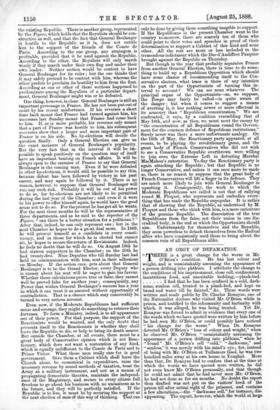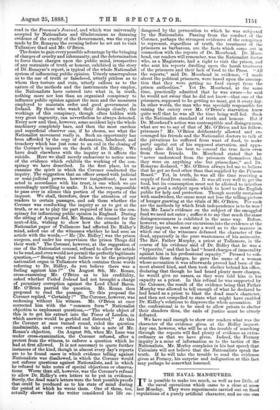AN ORGY OF DEFAMATION.
is a great change for the worse in Mr.
1. O'Brien's condition. He has lost colour and weight, and is unmistakably assuming the appearance of a person drifting into phthisis. I attribute the change to the conditions of his imprisonment, close cell, confinement, innutritious food, and unsuitable bedding,—plank-bed. I find that he has been confined in a cold, dark- some, sunless cell, treated to a plardr-bed, and kept on bread and water till he fainted,' &c. These words were written and made public by Dr. Charles Ronayne, one of the Nationalist doctors who visited Mr. O'Brien while in prison, and testified to the inhumanity and barbarity with which, it was alleged, he was being treated. Yet Dr. Ronayne was forced to admit in evidence that every one of the words which we have quoted were written by him before he had seen Mr. O'Brien, or could ssibly have noticed "his change for the worse." " • en Dr. Ronayne detected Mr. O'Brien's "loss of colour and weight," when he observed Mr. O'Brien "unmistakably assuming the appearance of a person drifting into phthisis," when he " found " Mr. O'Brien's cell "cold," " darksome," and "sunless," it was merely with his mind's eye ; for, instead of being with Mr. O'Brien at Tulla.more Gaol, he was two hundred miles away at his own house in Youghal. More than that, Dr. Ronayne had to confess that at the time at which the words we have quoted were written, he did not even know Mr. O'Brien personally, and that though he could not admit that he had never seen- Mr. O'Brien, he had not done so for six months. No doubt the report thus drafted was not put on the visitors' book of the prison till after actual sight of the prisoner, and contains a few alterations,—the " darksome cell," for instance, dis- appearing. The report, however, which the world at large read in the Freeman's Journal, and. which was universally accepted by Nationalists and Gla,dstonians as damning evidence of the cruelty of the Government, was the report made by Dr. Ronayne the evening before he set out to visit Tullamore Gaol and Mr. O'Brien.
Thsdesire to gain everypossible advantage by the bringing of charges of cruelty and inhumanity, and the determination to force these charges upon the public mind, irrespective of any restraints of truth or honour, exhibited in the story of Dr. Ronayne's report, is typical of the whole Nationalist system of influencing public opinion. Utterly unscrupulous as to the use of truth or falsehood, utterly pitiless as to whom they torture and ruin, utterly callous as to the nature of the methods and the instruments they employ, the Nationalists have entered into what is, in truth, nothing more nor less than an organised conspiracy to influence public opinion against the men and the measures employed to maintain order and. good government in Ireland. By those who watch their doings closely, the workings of this conspiracy, though often hidden with very great ingenuity, can nevertheless be always detected. Every now and then, however, some accident lays the whole machinery completely bare, and then the most careless and superficial observer can, if he choses, see what the Nationalist movement really is. Such an opportunity has been afforded. by the orgy of defamation, falsehood, and treachery which has just come to an end in the closing of the Coroner's inquest on the death of Dr. Ridley. We have dealt elsewhere with the inquiry as it affects the suicide. Here we shall merely endeavour to notice some of the evidence which exhibits the working of the con- spiracy we have described. In the first place, let us examine the spirit in which the Coroner conducted the inquiry: The suggestion that an officer armed with judicial or semi-judicial powers, however insignificant, has not acted in accordance with his trust, is one which we are exceedingly unwilling to make. It is, however, impossible to pass over in silence this portion of the reports of the inquest. We shall, therefore, draw the attention of our readers to certain passages, and ask them whether the Coroner was conducting the inquiry so as to get at the truth, or so as to play the part required of him in the con- spiracy for influencing public opinion in England. During the sitting of August 3rd, Mr. Ronan, the counsel for the next-of-kin, wishing to show how the attacks in the Nationalist paper of Tullamore had affected Dr. Ridley's mind, asked one of the witnesses whether he had seen an article with the words,—" He [Dr. Ridley] was the prison surgeon, and under his supervision the prison Thugs did their work." The Coroner, however, at the suggestion of one of the Nationalist counsel, refused to allow the article to be read, and even would not permit the perfectly legitimate question,—" Seeing what you believe to be the principal nationalist organ in Tullamore which contains those words referring to Dr. Ridley, do you believe there was a feeling against him On August 8th, Mr. Ronan, cross-examining Mr. O'Brien as to his credibility, asked whether United Ireland had not brought a charge of pecuniary corruption against the Lord Chief Baron. Mr. O'Brien parried the question. • Mr. Ronan then proposed to read the passage. To this proposal the Coroner replied, "Certainly !' The Coroner, however, was reckoning without his witness. Mr. O'Brien at once corrected him with the "common form" Nationalist objection to unpleasant questions,—" The whole object of this is to get biz extract into the Times of London, in which answers would. be garbled and distorted." At this the Coroner at once tuned round, ruled the question inadmissible, and even refused to take a note of Mr. Rona•n's objection. On August 9th, when Mr. Lane was under cross-examination, the Coroner refused, after a protest from the witness, to enforce a question which he had at first allowed. It is not necessary to quote further instances of the kind, though in almost every day's reports are to be found cases in which evidence telling against Nationalists was dim flowed, in which the Coroner would not enforce questions against Nationalists, and in which he refused to take notes of special objections or observa- tions. Worse than all, however, was the Coroner's refusal to allow Dr. Ridley's own letters to be put in evidence. Surely, the dead man's letters were the best possible proofs that could be produced as to his state of mind during the period. at which he wrote them. One of them, too, actually shows that the writer considered his life en- dangered by the persecution to which he was subjected. by the Nationalists. Passing from the conduct of the Coroner, perhaps the strongest evidences of the conspiracy to represent, regardless of truth, the treatment of the prisoners as barbarous, are the facts which come out in connection with the reports of Dr. Moorhead. Dr. Moor- head, our readers will remember, was the Nationalist doctor who, as a Magistrate, had a right to visit the prison, and who sent his reports dwelling upon the harsh treatment of the prisoners and their lack of food to the Press. "All the reports," said Dr. Moorhead in evidence, "I made about the political prisoners, were based upon the assump- tion that they were getting no food. except from the prison authorities." Yet Dr. Moorhead, at the same time, practically admitted that he was aware—he said he would not swear that he did not know—that one of the prisoners, supposed to be getting no meat, got it every day. In other words, the man who was specially responsible for raising the outcry over Mr. O'Brien's starvation knew quite well that he was all the time being well fed. Such is the Nationalist standard of truth and honour. But if Dr. Moorhead's action was contemptible and disingenuous, what are we to say of that of Mr. O'Brien and his fellow- prisoners ? Mr. O'Brien deliberately allowed and en- couraged his friends and the Nationalist doctors to talk of the privations he suffered from want of food, to make party capital out of his supposed starvation, and appa- rently also did his best to conceal the true facts even. from those friends. Dr. Moorhead stated that he "never understood. from the prisoners themselves that they were on anything else but prison-fare," and Dr. Ronayne declared, "Mr. O'Brien always led me to believe that he got no food other than that supplied by the Prisons Board." Yet, in truth, he was all the time receiving a supply of food from outside. It was all very well to get the food, but its consumption must not be allowed to interfere with so good. a subject upon which to howl to the English public for help and protection. Though secretly sustained with sandwiches, the cause must not lose the telling picture of hunger gnawing at the vitals of Mr. O'Brien. For such are the methods by which Irish independence is to be won Into Mr. Lane's evidence on the subject of the smuggled food we need not enter ; suffice it to say that much the same disingenuousness is exhibited in the Same way. Before, however, we abandon our excursions into the evidence at the Ridley inquest, we must say a word as to the manner in which one of the witnesses defamed the character of the dead, apparently in the pure wantonness of his animosity. The Rev. Father Murphy, a priest at Tullamore, in the course of his evidence said of Dr. Ridley that he was a "hypocrite," and that he had "heard charges of immorality against him in his professional capacity." Pressed to sub- stantiate these charges, he gave the name of a woman whose accusation it was afterwards proved had been of the most absurd kind, and then took shelter behind. his office, declaring that though he had heard plenty more charges, he would give no names, as they were told him in his capacity as a priest. In this refusal he was supported by the Coroner, the result of the evidence being that Father Murphy was allowed to tell enough of what he declared he had heard as a priest to blast the dead man's character, and then not compelled to state what might have enabled Dr. Ridley's relations to disprove the whole accusation. If the confessional is to be used to allow priests to shelter their slanders thus, the ends of justice must be utterly defeated.
We have said enough to show our readers what was the character of the evidence given at the Ridley inquest. Any one, however, who will be at the trouble of searching through the reports will find plenty of evidence as extra- ordinary as that we have given. Indeed, the Fermoy inquiry is a mine of information as to the tactics of the Nationalists. Mr. Morley complains in his last speech that Unionists will not believe that the Nationalists speak the truth. If he will take the trouble to read the evidence given at Fermoy, his surprise and indignation at this fact may perhaps be somewhat lessened.



































 Previous page
Previous page